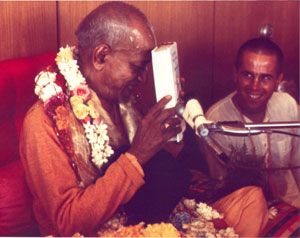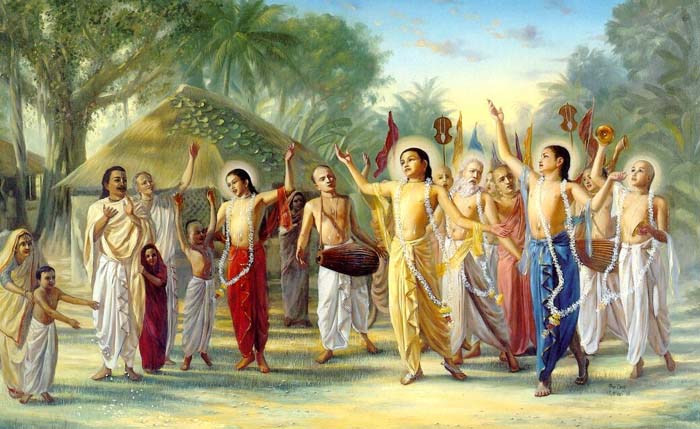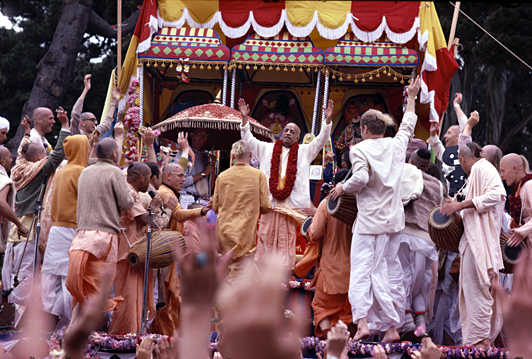Chapter 15-Preaching and Book Distribution
Education Through Spiritual Literature

The main business of the Hare Krishna movement is to bring people
to the platform of understanding their original, constitutional
position as an eternal servant of the Supreme Lord, Sri Krishna.
Therefore the devotees are primarily engaged in educating the
public in spiritual values.
Srila Prabhupada has written 51 books, which are translations
and commentaries of the ancient Vedic scriptures. These books
give the highest form of spiritual knowledge, and Srila Prabhupada's
purports make the meaning clear and concise.
The Bhaktivedanta Book Trust (BBT), the world's largest publisher
of Vedic texts, has produced all of Srila Prabhupada's books
in editions praised by scholars throughout the world. The BBT
is translating and printing books in all modern languages in
order to make this knowledge available to all people.
Devotees buy these books from the BBT and distribute large
quantities of them in most countries of the world. An estimated
400,000,000 pieces of literature have been distributed in the
last 30 years of since Prabhupada came to the United States.
These books are considered Srila Prabhupada's crowning achievement
and the most important means of educating humanity in the science
of God consciousness.
Harinam Sankirtan

Sankirtan is congregational chanting of the holy names of the
Lord and distributing the books of Srila Prabhupada. Lord Sri
Caitanya Mahaprabhu introduced the sankirtan movement 500 years
ago and it is the spiritual process recommended in the Vedas
for the age of Kali, the age we now find ourselves in. From the
beginning of the Krishna consciousness movement in the West,
Srila Prabhupada directed the devotees to chant congregationally
in the temple as well as in the parks and streets of the towns
and cities. Soon, devotees began selling Back To Godhead magazines
alongside the chanting party, and when book distribution started,
it was also called "going out on sankirtan." Srila
Prabhupada said that book distribution is the most important
form of sankirtan, because it spreads transcendental knowledge
and engages people in devotional service. It is the Brhat Mrdanga
"the big drum". Therefore the production and distribution
of transcendental literature is very pleasing to Srila Prabhupada
and the entire disciplic succession.
Public Programs

Every center holds public programs, in which initiated devotees,
Vaishnava brahmanas, speak on spiritual philosophy and answer
any questions which the audience may have. In the Sunday program,
the devotees chant mantras congregationally, give lectures, provide
some spiritual entertainment, and offer a grand feast to the
guests.
On specific holy days of the year, festivals are celebrated
in prominent places. In the famous Rathayatra Festival, the Lord
rides through the streets on a chariot pulled by thousands of
enthusiastic followers. Over 4 million people in Calcutta take
direct part in this ecstatic event.
Each major temple holds festivals on the appearance days of
Lord Krishna, called Janmastami; Lord Caitanya, called Gaura
Purnima; Lord Ramacandra, called Ramanavani; and Lord Nrsimhadeva,
called Nrsimha Caturdasi. The appearance days of these incarnations
of Krishna are celebrated with a big festival, shows, displays,
chanting and feasting. Everyone is welcome to attend.
On every continent, the Padayatra program's enthusiasts walk
hundreds of miles throughout the countryside, usually with a
bullock-drawn chariot upon which the Deity form of the Lord stands.
Most people are fascinated by the bulls and their mild behaviour
(they are devotees too!) and the dedication of the devotees who
walk and chant every day from town to town, village to village,
and hold a public program and distribute prasadam (spiritual
food) at night.
Sometimes devotees put on a Festival of India, where they
have free prasadam, exhibits of Vedic culture and philosophy,
Bharat Natyam dancers, plays and musical entertainment. People
of all kinds come for the spiritual fun.
Restaurants
Restaurants (usually named Govinda's or Gopal's) are popular
all over the world because one can be satisfied with the tasty
dishes they offer at a modest price. Such dishes are designed
to convince even a determined meat-eater that vegetarian food
is healthy and delicious. Beyond that, the food is prasadam,
or spiritualized food that has been offered to Govinda, Krishna,
the satisfier of senses. Therefore Govinda's Restaurants are
also designed to convince the determined restaurant-goer that
prasadam is worth eating all the time.
School Preaching
Educational institutions train children to function in society,
and because society is in constant flux, school constantly modify
their teaching programs. But real knowledge doesn't change. Therefore
the Krishna Consciousness movement presents the absolute knowledge
of the Vedas in classrooms to show that Krishna Consciousness
is based on science and not blind faith, sentimentalism, or speculation.
The science of Krishna Consciousness includes also the means
to directly experience absolute knowledge and a sublime goal
by which everyone can become happy. When a devotee is invited
to give a classroom presentation, he begins with kirtan, chanting
the holy names of the Lord, and all the students can participate.
Then he speaks for about thirty minutes on the philosophy of
Krishna Consciousness and then answers the students' questions.
Before he leaves, everyone gets prasadam, spiritual food, an
invitation to a Sunday feast, and a chance to buy books at a
reduced rate for students. The teachers often write letters of
appreciation and usually invite us to return year after year.
Food for Life: The World's Largest Vegetarian Food-Relief
The International charity program Hare Krishna Food for Life
is doing its part to combat world hunger by providing free meals
to the needy. For the past two decades, the Food for Life program
has served over 65 million hot, nutritious vegetarian meals through
America, Asia, Africa, Australia, and Europe. Srila Prabhupada,
founder of Food for Life, began the program in 1972, stating
that "No one within ten miles of our kitchens should go
hungry." Since that time Food for Life has emerged as the
world's largest vegetarian food-relief service, with programs
in over 62 countries.
The meticulous preparation and vast distribution of vegetarian
foods has always been an essential part of the 5000-year-old
cultural tradition that Food for Life represents. In Vedic times,
whenever a householder made prasadam, he would call out into
the street, "Prasadam," 3 times and offer the food
to others before he would eat. Today, the program distributes
up to 350,000 free meals every month from vans and free food
restaurants, as well as to homeless shelters, orphanages, mental
hospitals, schools, and disaster areas.
At the risk of their lives, Food for Life volunteers also
help in areas of conflict, feeding innocent victims of war. Food
for Life's courageous men and women have been bringing food,
hope and happiness into the lives of orphans, the elderly, single
mothers, and handicapped children in Sarajevo, Grozny, and Sukhumi.
Over two million free meals have been served in these three cities.
Governments in many parts of the world have recognized the
effectiveness of Food for Life in addressing the world hunger
problem and are supporting the service with money, buildings,
vehicles, and food. "Food for Life can feed more people
for less money than any other food-relief organization in the
world," claims Paul Turner, international director for the
service, "primarily because we're totally vegetarian and
partly because all Food for Life members are volunteers."
Started in the early 70's personally by Srila Prabhupada,
the goal of this program is to feed needy people, wherever they
may be, with spiritually and materially nutritious food. To date,
tens of millions of plates of prasadam have been distributed
throughout the world.
During the severe floods in Eastern India, the Food For Life
was the only relief team to bring kichari, the staple Bengali
food, by boat directly to the starving people. FFL is now being
praised by both Russian and Chechnyan authorities as having the
most efficient food-distribution program in the embattled region.
In Sarajevo, despite the hostilities, FFL has for many years
been supplying hospitals and educational institutions with needed
food. In Australia and America, regular programs for feeding
the poor and homeless make life more pleasant for these desperate
people. There are literally hundreds of examples of the good
work done by dedicated volunteers who take nothing in the way
of salary for their charitable work. FFL relief organizations
have also supplied clothing and blankets in areas of major earthquakes
and other disasters.
|

